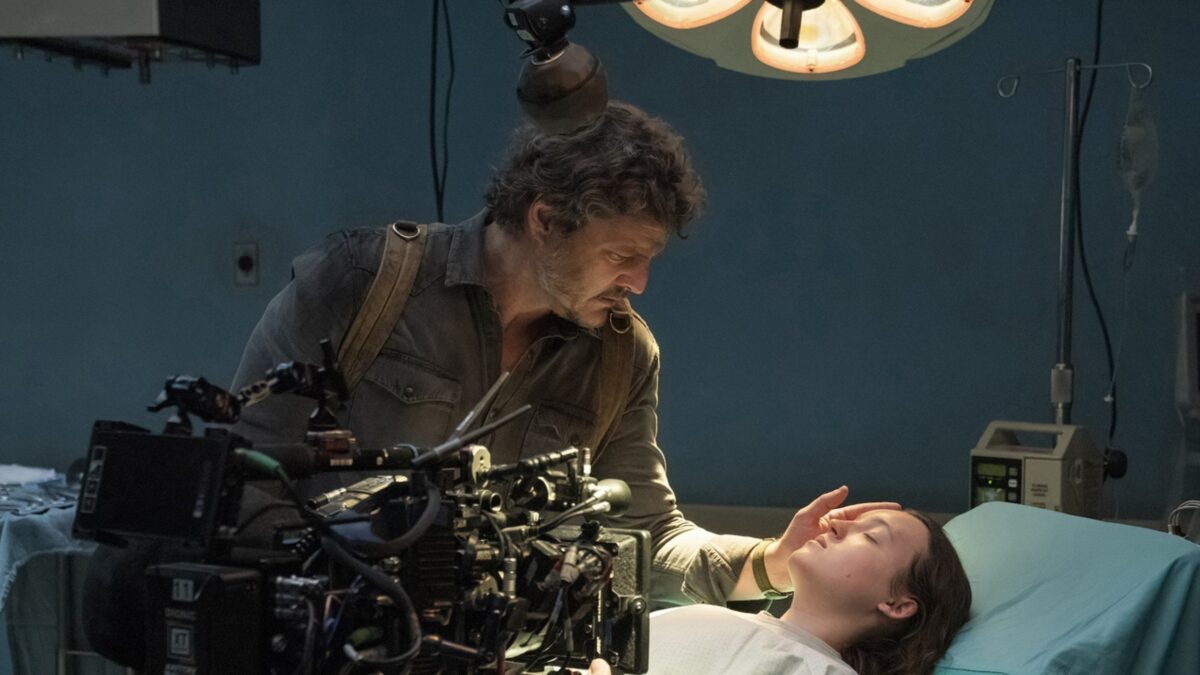
Kevin Roache and Marc Fishman, re-recording mixers, tell us about creating immersive soundscapes for The Last of Us.
Marc Fishman and Kevin Roache are masters of sound design. Fishman has extensive experience in film and TV, working in genres from Bridesmaids to Devil to Sicario: Day of the Soldado. Roache has worked on prestige TV shows like Narcos, Dexter, True Blood, and The Killing.
As re-recording mixers on The Last of Us, they helped bring to life a post-apocalyptic world filled with roaming infected and violent factions, but their work is also present in the quieter moments as characters connect in silence. Sound is incredibly important in the universe of The Last of Us, where the iconic croak of clickers means they’re looking for prey, and classic music is used to signal distress.
With their skills and attention to detail, Roache and Fishman played a pivotal role in shaping the sonic landscape of this highly acclaimed television series. In this exclusive interview, we delve into their creative process, gaining insights into their work on The Last of Us, and discovering invaluable advice they have to offer to young filmmakers venturing into the realm of sound design.
The following interview has been edited for length and clarity.
No Film School: First of all, I’d love to know how you all got into the world of sound and what makes you passionate about it.
Kevin Roache: Since I was a kid, [I’ve] just been really enamored with movies and television in general. Just can’t get enough of it. Always loved it. The only thing I was really aware, conscious of sound growing up, you’d see little behind-the-scenes videos of things of people doing foley or you learn about Ben Burtt or Gary Rydstrom working on Star Wars or Jurassic Park, and how did they make those sounds? That’s not the real sounds. And you got that going on in the back of your head. But I came to Los Angeles from Boston, went to film school, didn’t have a real specific area that I wanted to focus in, and one day just ended up down in the sound department looking for a job.
I thought, “These are my people.” They were really fun, crazy, always joking, always laughing. But it was a place where you could be creative. I have a good strong technical math and science background. It was like this confluence of all of the things that I enjoyed and had a talent for. It was fun. It was just fun. What I’ve learned is just what power we have over the audience dramatically to make them feel things emotionally and how we can affect them without them even knowing. It’s like a little magic trick. We can be in the background sneaking around and playing something sweetly or softly or really rip their throat out with something really violent loud and crazy. So it’s great. It’s a privilege and it’s really fun.
Marc Fishman: I think a little bit like Kevin, I came out to USC to study film, and I was there for two years, and I was always one of those people. I was always into technology. I was the first person that had a CD player of all my friends. I was one of those geeky guys. It was just through reading magazine articles and realizing that there was this marriage of technology and filmmaking that wasn’t about writing a script or wasn’t about being a musician or wasn’t about acting. So I can just remember there was a book out about all the articles that Mixed Magazine had written for all this time about film sound and stuff. It was just a thing that clicked just like Kevin said, and then once you start looking into it and realizing what a cool part of the business it is and what a cool part of the filmmaking process it is, it was really, I was hooked. That was it.
NFS: Both of you were re-recording mixers on The Last of Us. For the uninitiated, can you tell us what that looks like on your end, in terms of post-production?
Fishman: Well, sure. I think the easiest way to explain it is if you look at the soundtrack of a film as a meal, sound editors create all the ingredients, and Kevin and I cook the meal. So under the direction—on a broadcast show, it’s the showrunner. On a feature film, it would be a director. But we take all the various elements that make up the soundtrack. I do dialogue and music. Kevin does everything else, which would be background sound effects, hard sound effects, which would be car doors and cars and guns, and all that stuff. Then any sound design and any foley sound effects, being feet. Then Kevin handles that. Then we work together and we go through a project, seconds at a time, minutes at a time, and we put it all together and try and make it as cohesive as possible.
We work with a big team of sound editors on this show. It was headed up by Michael Benavente. We had various dialogue and sound effects editors. We had two great sound designers, Chris Terhune and—
Roache: Chris Battaglia.
Fishman: Chris Battaglia. But they were “the Chrises.” We just take all those elements and put them together. Then we work one-on-one with the picture editors and the directors/showrunners to put together the final soundtrack. So what comes out of our mixing stage is what you hear on a TV screen or in a movie theater.
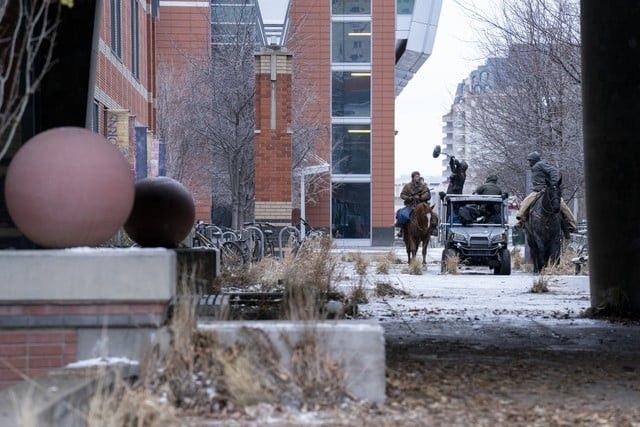
NFS: What’s unique about working on a show like The Last of Us, where the universe is post-apocalyptic, but you have so many different soundscapes, some of which are very, very silent, some of which are noisy and bright, like the mall?
Roache: One thing that’s unique about this show is every episode was a new experience and every environment in the show was different. We’re often in a different city, a different location, and for the most part, locations that we’re dealing with, different levels of natural decay. Things that were inhabited, like you said, the mall with people before the apocalypse happened, or would be in some natural spaces, but regardless, usually devoid of much of modern humanity as we know it. So in each setting, we had to discover what each environment would sound like during each episode.
Normally in a television series, you repeat locations that you go back to. So you might spend the first couple figuring out what something’s going to sound like. Then once you’ve got that dialed in, you repeat the process. In this case, we always had to start over and ask ourselves questions. “What would this sound like?” And we had a great team and we had the great direction of our showrunners and editors helping guide us as to how that would all sound.
Fishman: Yeah, and I think what’s unique about Last of Us too is it’s usually two people. The normal things we have—when I say, hide behind—being a dialogue mixer, I’ll always have various noises from the production or traffic or planes or all that stuff. You can’t do that on a show like this after the first episode. There’s not a lot of interaction with a lot of other humanity in big numbers. If you look at Episode 3, “Long Long Time,” a lot of it is either after the opening, it’s either Joel and Ellie or it’s Bill and Frank and that’s it. There’s nobody else around.
Bill and Frank are in the house, and we had discussions about how to play the room tones in that sound because there was nothing outside. A lot of times you’re in a residential location and Kevin will be asked to put in a lawnmower or a dog barking or X, Y, Z. You can’t do that. So that was really challenging of trying to find out how to not make these three or four-minute scenes boring, but not having any of the other things to rely on. It was putting in just a slight creek of the house when somebody wasn’t talking or making sure the air was supporting the acting and stuff. That was hard. There were a lot more of those scenes in this show than the things that were a little more obvious.
Roache: Something—to further what Marc said—was having really just incredible, detailed, foley in the show, because scenes would be so quiet and we would be focused on small things and small movements. One of the things that we say that our showrunner, Craig Mazin, was very focused on was making the environments as realistic as possible. We wanted this show to sound real, never fake as much as possible. The foley team headed up by Randy Wilson put such intense, incredible detail and such character into their performances. We were able to let these quiet scenes give the ear something to hold onto even when seemingly nothing else is going on.
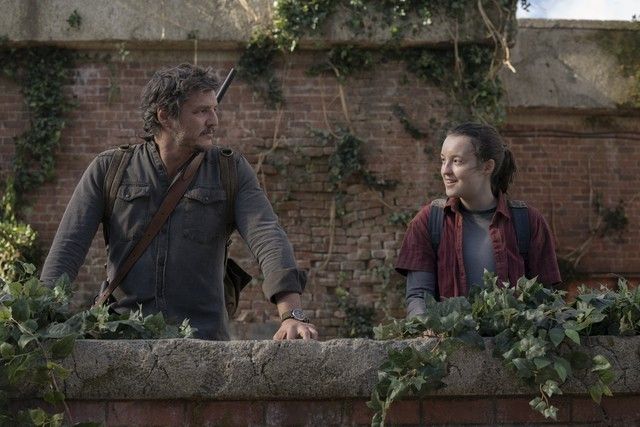
NFS: You said something that is just really interesting to me—”The air supporting the acting.” Can you expound on that?
Fishman: Kevin and I always have a conversation about, if people are talking or if people are being quiet, how much he can support that without it sounding like a set? We don’t usually have to have those conversations about these dialogue scenes, but we had quite a few of them. Just discussing, is this working? Because when you only have the air to play with, you have to use it so it doesn’t sound like they’re on a set or a manufactured film shoot, but that it helps keep it going.
As Kevin said, it doesn’t make it feel boring, and so it was just—Kevin’s a real detail-oriented person. So that’s great to work with somebody like him who knows. Some people will have a tendency just to shove the air up and not think about the drama, but we didn’t have that problem.
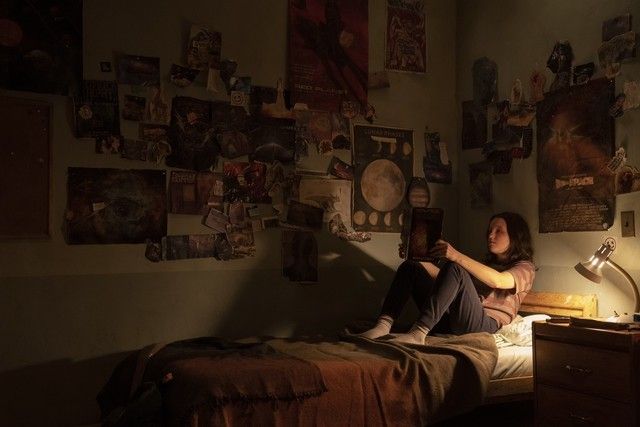
NFS: You mentioned working with Craig Mazin, who I think is one of the greatest working writers today. He said at NAB recently that he writes sound into his scripts, so he knows the value of sound to storytelling. What was it like working with him, and what did that process look like?
Roache: Yes, he writes sound into his scripts and he knows that this experience isn’t just a visual one. It is how film replicates how we all experience the world, which is through our eyes and with our ears. So he’d have so much detail already, exactly how things would work. One example that was very important to Craig was the mall episode, that you brought up. When they’re playing Mortal Kombat. Craig had a very visceral memory from when he was a kid about when he would put the coins into the video game machine, and the cabinet that held the video game would resonate and shake with this low-end sound. So that was something that was really important to him.
Another thing is just, Craig’s edict was he wants this world to be real at all times. He was focused on the reality of the situation. Yes, this intense fantastical situation is happening with this fungus takeover of the world, but he wanted it to seem like, “What if this really happened?” So it was never about how can we make something seem magical or impressive or huge. It was about, how can we make this as if it were really happening so we can draw the audience into the reality of the situation? That was a huge deal. Maybe our first approach when we were starting out on the show was occasionally as Marc … Marc, what did he say? Is that it sounded too Hollywood? How did he put it?
Fishman: Yes, too action movie-y, too blockbuster. He didn’t want that.
Roache: Yeah.
Fishman: I use the word Bruckheimer-like, he never wanted it to be bombastic. It always had to be about the story and about being realistic. He never wanted to take people outside of it. I think that’s why the show works for a lot of people.
I wanted to do the show. I was a huge fan of the game. I’m a gamer, and that was really intriguing to me. But I wanted to do this because I think Chernobyl is one of the best TV shows ever made, and when I found out Craig was going to be doing this and then also found out that Neil Druckmann was also going to be involved, that’s just what led me to pursue getting to work on the show and working with Craig, there really isn’t anything in any of the shows that he wouldn’t talk about or think about or be involved with. Every little detail, he would have it, and he would talk to you and discuss notes or ideas as if he was in a writing room.
He would say, “Well, why would you do that?” Or if you were talking about why the infected would sound a certain way, it was the discussion of, what would happen to their body physically, and what that would do to their vocal cords, and those things. So it was almost always a deep dive into that conversation. It wasn’t like, “Oh, I just don’t like that sound.” It would be like, “Oh,” you could see how he was always writing about what he wanted to come out of the speakers. That’s super, super, super rare, and amazing. He is a force/freak of nature.
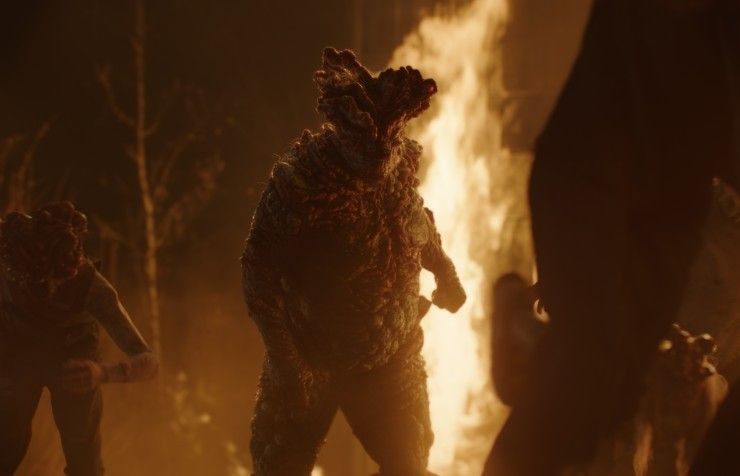
NFS: What are you most proud of in terms of sound on this show?
Fishman: I think all of it. I think we’ve gotten more comments on this show. I know I’ve gotten more comments and reach out from people in the business. Every episode is different. Four and five are a little more book-endy episodes, but every episode is shot differently, thought about a little differently, and they’re all unique. I don’t think you look at any of them if you’re really being critical about listening and go, “Oh, this one sounds like that one,” but I think there is a very cohesive hold to that, and I think that obviously ties into the amazing writing, and to have Gustavo [Santaolalla]’s score.
The thing I’m most proud of is that it’s a show that I haven’t had one person that comes up and goes, “Ah, that was an okay show.” You get lucky and get to work on some of these shows, and then they turn out to be something that has a bit of a zeitgeist to it—and to just be a part of that and to have been in the middle of it.
You were asking about being in sound for film or television. It’s one of the unique positions if you think about it—director of photography, production designers, film editors. We’re one-on-one with the creative force behind a show, either a director or a showrunner. And you’re sitting with these people for weeks and weeks on end. A colorist. It’s a real unique position. So I’m just flattered and excited to just … I’m so proud that I got to be—that Craig trusted us to get his vision there because he’s not the type that if he wasn’t happy, he would not find somebody else. So I’m proud I survived and really proud of the work.
Roache: Yeah, I’m proud I’m of us and I’m proud of everybody on the entire team, and I’m mostly proud of how we tried to make every single moment exactly right, exactly perfect. We never let up. I go back and I watch and I see these nine hours of television and I remember us really pouring our focus into every moment and never falling down, and everybody really just doing the best that they possibly could.
That’s all I can really say, is just each moment was important in the show, and thought about, and considered and carefully done, and when you can sit back and watch the entire breadth of it and it’s like, “Oh, this episode fell down,” or “This scene didn’t really work.” It’s just like, “No, we really hammered it all.”
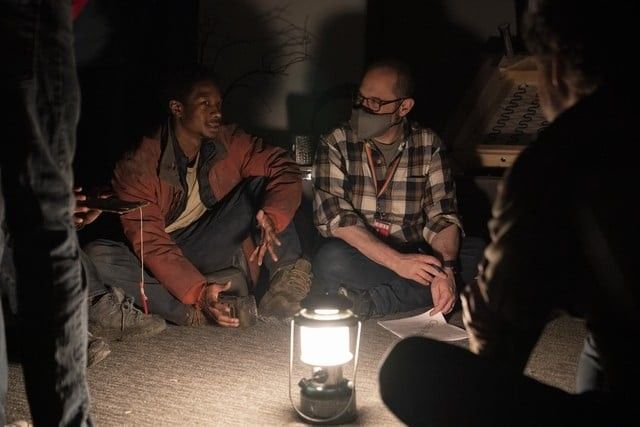
NFS: What advice would you give to someone getting into your field?
Fishman: Well, it’s hard now to pinpoint anything to watch or read because everything’s accessible to everybody all the time. My biggest piece of advice would be, is if you find something that’s really inspiring to you, if you said … I can remember the moment. Oh, I saw Jurassic Park and I go, “Oh, my gosh, that was the most amazing thing ever. Who did that?” I thought, “Oh, that’s Gary Rydstrom.” Call up. Find where people work and call them. Most people in the sound business, they love people who love sound, and I’ve never not had somebody who’s called me from outside and said, “Oh, hey, can you give me some advice?” Or, “Can we meet?”
I think it’s hard. We tend to find out about reaching out to people on social media or doing all these things. Now, we’ve gotten a little bit away from interpersonal connection, and I think if something really inspires you and you go, “Oh, I want to learn more about that,” or just talk to somebody or that really was cool.
To me, that’s the biggest thing is don’t ever be afraid to reach out to people that have done something that you like, because I think they’re very accessible, and they want to share their passion, and I think that’s a really great way to start. I think people don’t do that enough.
Roache: Marc is absolutely right. I think you could contact so many people in the sound world and they would just be thrilled. So then people are listening.
The other thing I can think of to build your skill is, I did this at USC. I had a class where we took a scene that we liked and the object of the entire semester was to strip it bare, no sound at all, and completely do all the sound, re-do it all yourself. That will give you a great idea. And you can use—do it with any freeware like on a Mac or something like that. You could use iMovie or something like that with gathered sound effects or sound effects you record on your own, and try doing the ADR. Try doing all the foley, try doing all the side effects and replacing all the music, and see how a scene is really shaped by doing it all on your own.
You’ll learn so much and that’ll give you a great basis to get started and give you ideas about things you hadn’t even thought about before. It’ll give you a greater vocabulary so that when you do call the people that Marc’s talking about, you’ll have more to talk about and more to even show somebody.
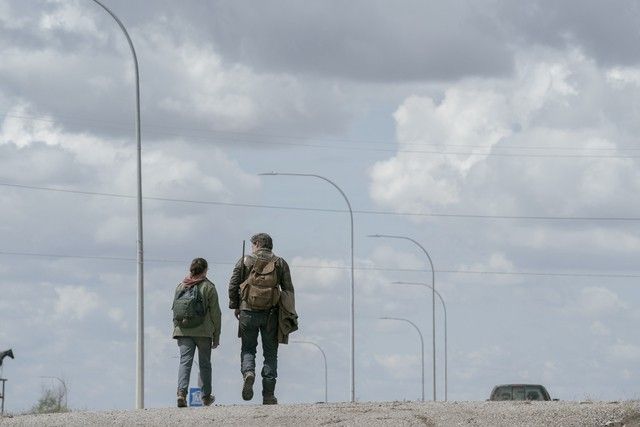
NFS: What are common mistakes that you see beginners make that they should avoid?
Fishman: Trying to do too much. I think with beginning sound effects, editors and sound designers, they try and they don’t pick one good sound. They throw 20 different sounds because they don’t necessarily have the confidence of that, and I think being simple is usually, I think consistently what I see is people trying to overcomplicate the situation and overthink it.
Roache: That’s great advice. Absolutely. It’s about finding out what the heart of the scene is about and not about maybe what sound effect you thought about was really cool. The other thing is sometimes … I’m guilty of this. You might think when you’re starting out that you should be here [at a high level], but really you have to start at a lower position and work your way up. Even though you might think, I’ve done X, Y, and Z and I should really be at the highest level right out of the gate. It just doesn’t work that way, but that’s okay.
It’s really actually a gift because there’s so much to learn about. Maybe even things that don’t seem obvious about interpersonal working relationships, business, things like that, that you have to get warmed up to and absorb before you really start working in a real capacity.
Fishman: Don’t forget—I’ve been mixing for, I think, over 25 years. I think you can never forget everything is a learning experience. It’s not something that, as Kevin said, you don’t start at a place and there’s no 100 that you’ll ever get to. There were things that I did on The Last of Us that I had to figure out how to do that I had not done. Or I’ve come in situations, and then you do it, and it’s because you’ve maybe done something like that.
But you just have to remember to not forget to keep pushing yourself and that you’re always, always, always learning. I know that sounds so cliche, but again, I feel like I learned a lot on this show, and I think it’s easier for me to try different things because of the experience, but if I close myself off—I think you’re always growing. I think you have to remember that it’s a journey, it’s a career. It’s not a one-and-done career path.
Roache: Yeah, if it’s something that you really want to do, I have no doubt. If you really are interested in it, you can achieve great things because the world needs great sound professionals, and anybody who has an interest in it can do it. If they focus, will do great … Trust me.














